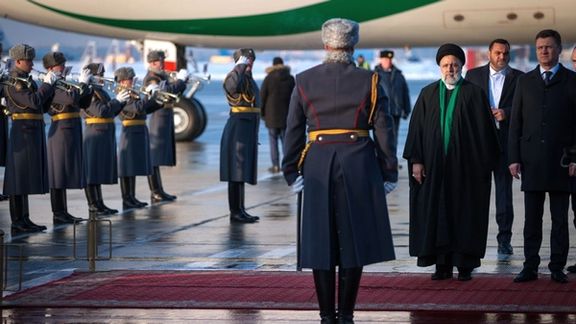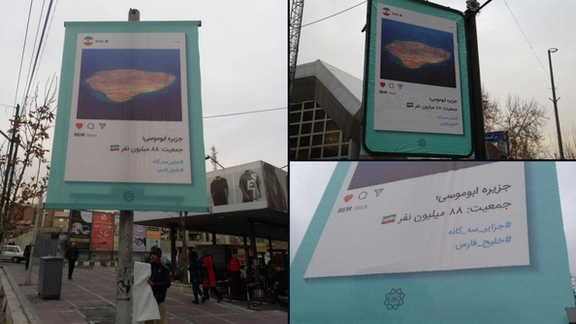Iran Toughens Response To Russia's Humiliating Stance

The controversy surrounding a recent statement from the Arab-Russian Cooperation Forum, which undermined Iran's territorial integrity, continues to escalate in Tehran.

The controversy surrounding a recent statement from the Arab-Russian Cooperation Forum, which undermined Iran's territorial integrity, continues to escalate in Tehran.
Amid mounting pressure from social media users, prominent political figures, including individuals with close ties to Supreme Leader Ali Khamenei, such as Ali Akbar Velayati, his senior foreign policy adviser, and Hossein Shariatmadari, his representative at the Kayhan newspaper, have raised objections to Russia's humiliating stance.
Meanwhile, banners and posters have been prominently displayed around the Russian Embassy in Tehran, boldly proclaiming that all the 88 million Iranian citizens are the residents of Abu Musa, the largest of the three islands claimed by the United Arab Emirates. Some social media users emphasized that President Ebrahim Raisi should visit Abu Musa to reassert Iran's ownership of the island. Some others alleged that there is a UAE military post on Abu Musa where the Emirate's flag is hoisted every morning. They even posted a video on Threads to prove what they said.

Shariatmadari, the editor of hardline Daily asked in an editorial: "What can Russia and Arab statement on the three islands be called other than hypocrisy and double standards in foreign policy?" Shariatmadari further addressed Russian Foreign Minister Sergey Lavrov and said: "Mr. Lavrov! Your error has the color of treason." He further demanded an apology from Lavrov and stressed that such an apology should be made immediately and publicly.
The Iranian public regards Shariatmadari’s statements as reflecting the views of Khamenei and his senior aides.
Russia’s action in siding with the Arab claim is also humiliating for Khamenei, who has shown a particular affinity for Moscow and President Vladimir Putin. He has been insisting that Iran’s best interests lie with close ties with Russia and China, while shunning opportunities to improve ties with the West.
This comes while the Raisi administration-owned newspaper, Iran, was the only newspaper that tried to minimize the importance of Russia's stance by arguing that although Iran and Russia are partners, they are not strategic allies.
Shahryar Heidari, a member of the Majles Foreign Relations Committee also demanded an apology from Moscow and said "otherwise, we will re-consider our relations with Russia."
The Foreign Ministry, which initially released a statement dismissing the Arab states' claims and condemning Russia's humiliating stance, later summoned the Russian ambassador in Tehran and formally presented a note of protest regarding Russia's involvement in the statement. This action was prompted by mounting pressure from social media and public sentiment.
The former chairman of the Iranian parliament's Foreign Relations Committee Heshmatollah Falahatpisheh accused the Foreign Ministry of naivety and said: "When the Iranian President's entourage counted the steps of the Kremlin during a recent visit to Moscow, Russian President Vladimir] Putin's agents were preparing the draft of an anti-Iranian statement in Abu Dhabi. This is a new example of naivety in Iran's foreign policy."
Falahatpisheh's successor, Vahid Jalalzadeh, has called for a reciprocal response to Russia's stance by raising the issue of the Kuril Islands, which are disputed in terms of Russian ownership by Japan. This suggestion mirrors the one made by Khamenei's adviser, Kamal Kharrazi, back in September when Russia took a similar stance during a GCC meeting.
Meanwhile, Foreign Ministry Spokesman Nasser Kanaani told the press in Tehran that his office has objected to Russia and protested Moscow's undermining of Iran's territorial integrity.
In another development former Foreign Minister Mohammad Javad Zarif reiterated that "it was a mistake by the Islamic Republic of Iran to give concessions to Russia," and that "we cannot expect the same kind of behavior from Russia as Moscow will never endanger its own interests for Iran".
In the meantime, Iranians continue to leave angry comments under social media posts and articles on websites about the issue. Under an article in conservative Alef website, readers said: "Russia has been backstabbing Iran for several hundred years now." They also reminded that "There are no permanent alliances. What is important is our national interests."
On Instagram, a user said: "You should expect such political behavior when you tie all of the country's national interests to one particular country from whose friendship Iran has never benefitted." Another user reminded the Foreign Ministry that it should defend the interests of Iran rather than Yemen and Palestine."